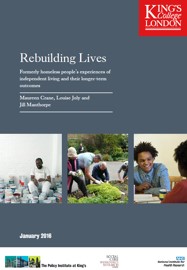Maureen Crane, Louise Joly and Jill Manthorpe introduce the final report of the Rebuilding Lives study, published today. (678 words)
 Homeless people clearly need homes but in order to keep them and to rebuild their lives they also need access to resettlement programmes that offer long-term support. A major new study by Unit researchers provides detailed evidence of what works in helping formerly homeless people to sustain a tenancy and avoid further homelessness.
Homeless people clearly need homes but in order to keep them and to rebuild their lives they also need access to resettlement programmes that offer long-term support. A major new study by Unit researchers provides detailed evidence of what works in helping formerly homeless people to sustain a tenancy and avoid further homelessness.
We maintained contact with a group of 297 homeless people over five years after they were rehoused. We were fortunate enough to gain funding from the National Institute for Health Research (NIHR) School for Social Care Research to undertake this ground-breaking study. In the Rebuilding Lives study we investigated their experiences, the ‘ups and downs’ of settling down and building a more settled life. It is the largest and only UK study of its kind. One major finding is that just giving someone who has been homeless a tenancy is not the sole solution to homelessness, as many formerly homeless people are still vulnerable during the first few years after being rehoused. Many experience problems living independently, and require ongoing support from housing, health and social care services – help many do not receive.
In our view planned resettlement for homeless people does work and should be encouraged. However, cuts to tenancy support services may put resettlement at risk.
The figures speak for themselves. The majority (89%) of study participants were in a tenancy five years after being resettled, but many were struggling financially and had difficulty meeting everyday living expenses. This did not mean that they could not fund luxury items but found basic living hard to manage:
- Over half ran short of money for food
- 44% did not have enough money to heat their homes
- Two thirds were living below the UK poverty line
- 24% had their social security benefits stopped or suspended in the previous year, leading in some cases to eviction for rent arrears
Gaining steady employment was another problem people faced with many only finding casual or ‘zero-hours’ work contracts, despite a keen wish to work. Irregular working hours together with low weekly incomes, further contributed to financial struggles. Working in the area of social care research we are well aware of the problems insecure hours pose for low paid workers, and these apply even more so to people who are trying to re-establish themselves and live independently after a period of homelessness.
A growing shortage of social housing (local authority or Housing Association tenancies) means that homeless people are now more likely to be resettled into the private rented sector. We found, however, that those resettled in private rented accommodation had much poorer housing outcomes than those who had moved into social housing. They were more likely to have lost their accommodation and to have become homeless again. They were also the least likely to have received support from services after being resettled. Young people also had poorer housing outcomes. Many of this age group struggled financially and accrued large debts. Some had histories of being under the care of a local authority as children.
A third (35%) of those interviewed in both the private rented sector and social housing were living in accommodation that had serious problems, such as dampness and mould, faulty heating or electrical wiring faults, in some cases resulting in ill-health. A quarter of participants were struggling to look after their accommodation and keep it clean, and a small number were hoarding and parts of their accommodation had become inaccessible.
Our study, Rebuilding Lives, examined the extent to which formerly homeless people do get back ‘on their feet’ despite enormous challenges. Our report which outlines the research findings makes a number of important recommendations about the services and support that are needed once homeless people are resettled. Many of these require professionals to build up relationships with people who have faced many difficulties and losses over several years. Professionals from a range of agencies have a role to play in helping to ensure that formerly homeless people are supported and their long-term needs are met – so they can rebuild their lives.
Notes
The Rebuilding Lives study was funded by the National Institute for Health Research (NIHR) School for Social Care Research. Dr Crane conducted the study with Dr Louise Joly and Professor Jill Manthorpe from the Social Care Workforce Research Unit in the Policy Institute at King’s. The study was undertaken in collaboration with five leading homelessness organisations: Centrepoint, Framework Housing Association, St Anne’s Community Services, St Mungo’s and Thames Reach.
Rebuilding Lives was a follow on to the ESRC-funded FOR-HOME study that took place in 2007-10 and investigated the outcomes of resettlement of 400 single, homeless people. Further details on the study can be found online.